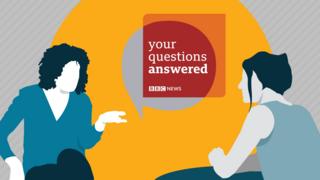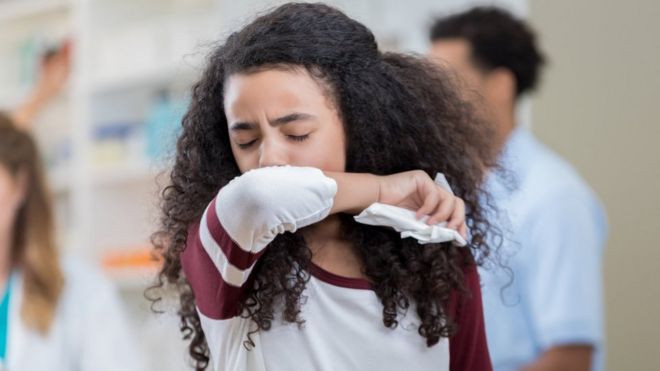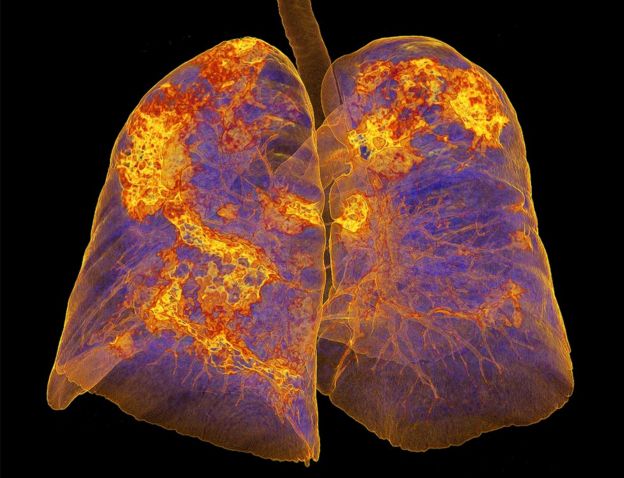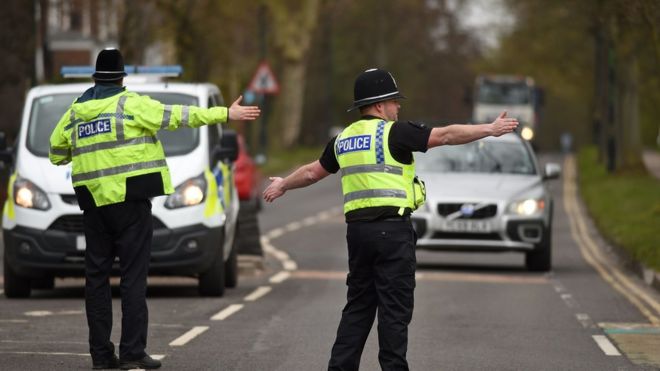
There have now been nearly three million coronavirus cases around the globe, and more than 200,000 deaths - 20,000 of them in the UK.
Readers have been getting in touch to ask questions about the outbreak.
Questions and answers
All about coronavirus
Your questions
Skip All about coronavirus-
What is the coronavirus? from Caitlin in Leeds Most asked
-
Once you've had coronavirus will you then be immune? from Denise Mitchell in Bicester Most asked
-
What is the incubation period for the coronavirus? from Gillian Gibs
 Michelle Roberts Health online editor
Michelle Roberts Health online editorScientists have said that the “incubation period” - the time between catching the virus and starting to show symptoms - is five days on average. However, some people can have symptoms earlier or much later than this.

The World Health Organization advises that the incubation period can last up to 14 days. But some researchers say it may be up to 24 days.
Knowing and understanding the incubation period is very important. It allows doctors and health authorities to introduce more effective ways to control the spread of the virus.
-
Is coronavirus more infectious than flu? from Merry Fitzpatrick in Sydney
 Michelle Roberts Health online editor
Michelle Roberts Health online editorBoth viruses are highly contagious.
On average, it's thought people with the coronavirus infect two to three other people, while those with flu pass it on to about one other person.
There are simple steps you can take to stop the spread of flu and coronavirus.
- Wash your hands often with soap and water
- Avoid touching your face unless your hands are clean
- Catch coughs and sneezes in a tissue and then put it in the bin
-
How long are you ill for? from Nita in Maidstone
 BBC News Health team
BBC News Health teamFor four out of five people Covid-19 will be a mild disease, a bit like flu.
Symptoms include a fever and dry cough. You may feel unwell for a few days but you should be back to normal within a week or so after the symptoms appear.
If the virus gets well established in the lungs it can cause breathing difficulties and pneumonia. About one in seven people may need hospital treatment.
My health conditions
Your questions
Skip My health conditions-
How dangerous is coronavirus for people with asthma? from Lesley-Anne in Falkirk
 Michelle Roberts Health online editor
Michelle Roberts Health online editorAsthma UK's advice is to keep taking your daily preventer inhaler (usually brown) as prescribed. This will help cut the risk of an asthma attack being triggered by any respiratory virus, including coronavirus.
Carry your blue reliever inhaler with you every day, in case you feel your asthma symptoms flaring up. If your asthma is getting worse and there is a risk you might have coronavirus, contact the online NHS 111 coronavirus service.
-
Are otherwise healthy disabled people more at risk from coronavirus? from Abigail Ireland in Stockport
 BBC News Health team
BBC News Health teamCoronavirus can be more severe in older people and those with pre-existing conditions such as heart and lung illnesses, or diabetes.
There is no evidence that disabled people who are otherwise healthy - and who don't, for instance, have respiratory problems - are at greater risk from coronavirus.
-
Will people who've have had pneumonia experience milder coronavirus symptoms? from Marje in Montreal
 BBC News Health team
BBC News Health teamCovid-19 can, in a small number of cases, lead to pneumonia, most notably in people with pre-existing lung conditions.
But as this is a new virus, no-one will have any immunity to it, whether they have previously had pneumonia, or any other form of coronavirus such as Sars.

Protecting myself and others
Your questions
Skip Protecting myself and others-
Why are governments going to such extreme measures to combat coronavirus when flu appears to be more deadly? from Lorraine Smith in Harlow
 James Gallagher Health correspondent
James Gallagher Health correspondentQuarantining cities and telling people to stay at home may seem extreme, but the alternative is to let the virus spread unrestrained.

There is no vaccine for this new virus, as there is for flu, which makes elderly people and those with underlying health conditions very vulnerable to its effects.
In China, lockdown measures appear to be working as new daily cases of the virus have now started to decline.
-
When will there be coronavirus antibody tests? from Alison May in Manchester
 BBC News Health team
BBC News Health teamAn antibody test shows whether someone has already had the virus. It works by looking for signs of immunity, using a drop of blood on a device that works a bit like a pregnancy test.
The government has expressed hope that antibody tests will be used to help the UK return to normal. But it has not yet found any that are reliable enough to use.
Moreover, it's not even clear at the moment that the presence of antibodies guarantees you are immune.
The World Health Organization's head of emerging diseases Dr. Maria Van Kerkhove said that while the tests measure the level of antibodies in the blood, there is no evidence they can show "that an individual is immune or is protected against re-infection".
-
Do we not have reusable PPE and can't it just be washed or left for three days for any present virus to die? from Chris Stone in Lancashire
 BBC News Health team
BBC News Health teamAll personal protective equipment (PPE) worn during the highest-risk situations - such as aprons, gloves and surgical masks - should usually be disposed of after a single use or session.
However, guidelines now say NHS staff can reuse some kit where it is safe to do so. For example, some gowns could be washed by the hospital laundry and reused.
The Health and Safety Executive says it recognises "some compromise" is needed in these "exceptional circumstances". But doctors and nurses are not happy with this situation.
The Royal College of Nursing says its members can refuse to treat patients as a "last resort" if adequate PPE has not been provided.
-
What should I do if someone I live with is self-isolating? from Graham Wright in London
 BBC News Health team
BBC News Health teamIf you’re living with someone who’s self-isolating, you should keep all contact to a minimum and, if possible, not be in the same room together.
The person self-isolating should stay in a well-ventilated room with a window that can be opened, and keep away from other people in the house.
If you live with someone who has symptoms, you'll also need to self-isolate for 14 days from the day their symptoms started - this is how long it can take for symptoms to appear.
If you get symptoms, self-isolate for seven days from when your symptoms start, even if it means you're self-isolating for longer than 14 days. If you do not get symptoms, you can stop self-isolating after 14 days.
-
I am currently self-isolating. Can I attend a hospital appointment? from Patricia Welsh in Aylmerton, Norfolk
 BBC News Health team
BBC News Health teamThe current government advice is to access medical assistance remotely, wherever possible.
However, those with a scheduled hospital or other medical appointment during this period, should talk to their GP or clinician.
This is to ensure that they continue to receive the care they need and consider whether appointments can be postponed.
-
Should people stop having sex? from Martha Menschel in Las Vegas
 BBC News Reality Check
BBC News Reality CheckIf you live with your partner, they count as being part of your household. If neither of you is showing coronavirus symptoms and you are already in close contact, having sex won't increase the likelihood of you catching the virus from one another. If one person does have symptoms, they should be self-isolating in a separate room.
Using contraception such as condoms won't alter your risk of catching the virus, as having sex will bring you into close physical contact anyway.
"If you are going to touch each other's genitals it's likely that you will potentially be kissing at the same time - and we know the virus is passed through saliva," Dr Alex George told the BBC's Newsbeat.
"Essentially, any possibility of transfer of coronavirus - from your mouth to your hands, to genitals, to someone else's nose or mouth - increases the risk of passing on coronavirus."
Me and my family
Your questions
Skip Me and my family-
I am five months pregnant and want to understand the risk to the baby if I get infected? from a BBC website reader
 James Gallagher Health correspondent
James Gallagher Health correspondentPregnant women are being advised by the UK government to stay at home and keep contact with others to a minimum. However, they should attend antenatal clinics as normal.
There is no evidence to suggest that pregnant women are more likely to get coronavirus. But, for a small number of women, being pregnant may change the way their body deals with a severe viral infection.
The government’s chief medical adviser says this is a precautionary measure until scientists find out more about the virus and that "infections and pregnancy are not a good combination in general”.
-
I am breastfeeding my five-month-old baby - what should I do if I get coronavirus? from Maeve McGoldrick
 James Gallagher Health correspondent
James Gallagher Health correspondentMothers pass on protection from infection to their babies through their breast milk.
If your body is producing antibodies to fight the infection, these would be passed on through breastfeeding.
Breastfeeding mums should follow the same advice as anyone else over reducing risk - cover your mouth when you sneeze and cough, throw away used tissues straight away and wash hands frequently, while trying to avoid touching your eyes, nose or mouth with unwashed hands.
-
Is it possible to catch coronavirus from a pet dog or cat? from Javed
-
What is the risk to children? from Louise in London
 BBC News Health team
BBC News Health teamIn general, children appear to be relatively unaffected by coronavirus, according to data from China and other countries.
This may be because they are able to shake off the infection or have no symptoms or only very mild ones similar to a cold.
However, children with underlying lung problems, such as asthma, may have to be more careful.
All schools in the UK are currently closed, except for vulnerable pupils or children of key workers.
Leaving the house
Your questions
Skip Leaving the house-
Can I walk my dog under the category of daily exercise? from James Leslie, Burgess Hlil Most asked
 BBC News Reality Check
BBC News Reality CheckYes you can.
According to government advice for people with animals, if you have a dog that needs walking, you should count this as the one form of exercise you take every day.
It's important that you should remain 2m away from anyone outside your household while walking your dog. There is no guidance from the government on whether your dog should be on a lead, but the Royal Parks, for instance, urge visitors to do this, to help ensure people keep social distance.
-
Is there a time limit on how long we can be outside for once-a-day exercise, and are we allowed to get in our car to travel to go for a walk? from Sam Fearn, York
-
My children live with their mother, but visit me. I live about 190 miles from them. Is it legitimate travel for me to drive to collect them? from Mark in Swansea
 BBC News Reality Check
BBC News Reality CheckYes it is.
Government guidance on staying at home says: "Where parents do not live in the same household, children under 18 can be moved between their parents' homes."
If neither parent nor child is showing symptoms of the virus or self-isolating, children of separated parents are still allowed to stay with either of them.
However, the Family Division of the High Court has said that, in England and Wales, if one parent is worried that moving their child would be going against public health advice, they may "vary the arrangement to one that they consider to be safe", even if the other parent does not agree.
Where this is the case, family courts will expect parents to allow contact by video chat or phone.
-
Should I wear a mask to protect myself and others from the virus? from Ann Hardman in Radcliffe, Manchester
My finances
Your questions
Skip My finances-
When will restrictions on house purchases be lifted? from Christian Jackson in South London
 Simon Gompertz Personal finance correspondent
Simon Gompertz Personal finance correspondentThere are currently no formal restrictions on moving house, although the government has strongly advised against it where possible. It says that while there is no need to pull out of transactions, buyers and renters should delay moving so they can observe social distancing and self-isolating guidelines.
If the house you are moving into is empty, it's fine to carry on as long as these rules are observed during the removals process. If the property is occupied, the government is encouraging the buyer and seller to find an alternative moving date further down the line.
-
Will lenders allow people with mortgages to delay payments during the outbreak? from Clare Waters
 Simon Gompertz Personal finance correspondent
Simon Gompertz Personal finance correspondentPeople affected by coronavirus will be able to delay their mortgage payments for up to three months.
It is important to bear in mind that any interest and capital repayments which are missed, will be added to the mortgage balance.
This means that any future monthly mortgage bills are likely to be slightly higher.
-
How do you get gas and electricity if you are on a pre-payment meter and can't get to a post office to top it up? from David E P Dennis
 Simon Gompertz Personal finance correspondent
Simon Gompertz Personal finance correspondentEnergy companies have promised to help you if you have a pre-payment meter. So you may be able to authorise a friend to top up your energy card for you.
You could also ask your supplier to send you a card by post which is already topped up. The government says that if it's urgent the supplier should be able to add credit directly to your account. You should be able to top up online as well.
And you will have to pay back any credit your supplier gives you. So you should contact them to ask about when and how to do this.
-
What should I do as I have not received a refund for a cancelled flight? From Susan in Offley
 BBC News Reality Check
BBC News Reality CheckIf your flight is cancelled, you are entitled to a full refund to the original form of payment within seven days, although many airlines are struggling to meet that deadline.
Ryanair, for example, says customers who want a cash refund will receive it ''in due course'' as it is dealing with a much higher volume of requests than usual, with fewer staff.
Many airlines are trying to avoid giving refunds and are offering vouchers for another flight or a free re-booking instead.
If the airline later folds, the voucher will probably become invalid. And any re-booking could affect the terms of your travel insurance.
Work issues
Your questions
Skip Work issues-
My company wants me to return to work on 1 May but this is still within the lockdown period. Is this legal? From Jim Bridgeman in Kettering
-
I'm self-employed. Can I claim benefits if I can't work due to the virus? from Mark Gribby in Nottingham
 Simon Gompertz Personal finance correspondent
Simon Gompertz Personal finance correspondentSelf-employed people who have symptoms or have been told to self-isolate may apply for two benefits - universal credit or employment and support allowance.
Normally, you would be eligible after four days of being ill. However, the government has responded to the spread of coronavirus by saying that companies will temporarily pay SSP from the first day off.
But charities are worried that there is still a five-week delay before universal credit is paid.
-
What if you're not on a salary and can't work from home if your workplace closes? from Joseph in Glasgow
 Simon Gompertz Personal finance correspondent
Simon Gompertz Personal finance correspondentIf you are employed, your employer has an obligation to pay your Statutory Sick Pay (SSP) for up to 28 weeks.
Normally, you would be eligible after four days of being ill. However, the government has responded to the spread of coronavirus by saying that companies will temporarily pay SSP from the first day off.
In the case of small and medium-sized employers, the government will fund sick pay for the first 14 days.
Eligible employees are entitled to £95.85 a week.
What do I need to know about the coronavirus?
What questions do you have about coronavirus? Do you want to ask it on BBC News? Get in touch and we may ask you to send us a video of you asking your question.
In some cases, your question will be published, displaying your name, age and location as you provide it, unless you state otherwise. Your contact details will never be published. Please ensure you have read our terms & conditions and privacy policy.
Use this form to ask your question:
If you are reading this page and can't see the form you will need to visit the mobile version of the BBC website to submit your question or send them via email to YourQuestions@bbc.co.uk. Please include your name, age and location with any question you send in.